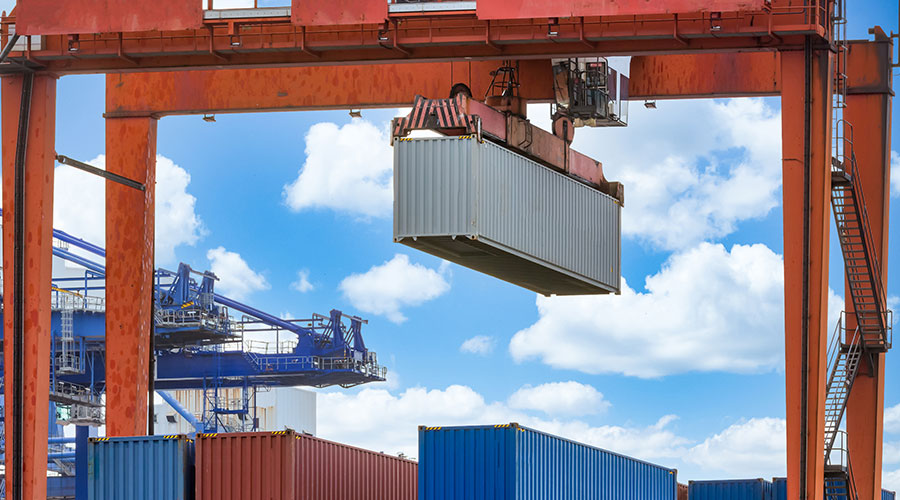

Labor warns Alabama Port Authority seeking automation 'back door'
A union is warning regulators that the federal government will subsidize future layoffs as well as freight automation if a "Buy American" waiver sought by the Alabama Ports Authority (ASPA) is approved.
ASPA informed the Federal Railroad Administration that the waiver was necessary to purchase two wheeled gantry cranes that ASPA plans to install at its Intermodal Container Transfer Facility (ICTF) in Montgomery, Alabama.
However, "due to the lack of responsive bidding from domestic manufacturers, and based on market research, ASPA has concluded that cranes that meet FRA's Buy American requirements are not available domestically," the FRA said.
"Without the waiver, ASPA claims that it will not be able to deliver the project because the planned operations cannot be carried out without two wheeled gantry cranes that meet ASPA technical specifications."
The FRA issued a preliminary ruling in November that found ASPA qualified for the exemption and invited public comment.
Greg Regan, chairman of the Department of Transportation and Trade (TTD), which represents railroad employees, responded that because ASPA's bid application provides for cranes to be allowed to be converted to remote operation in the future, the waiver "could be a backdoor to federal funding to cover the cost of much of the equipment that will eventually be converted to semi-automated or automated functions."
"In short, if this strategy is successful, it will incentivize operators to make purchases that they would not have made without government intervention." In other words, the federal government will subsidize near-term layoffs."
The Montgomery ICTF is an important part of the ASPA's development plan. It will extend from ASPA's container terminal at the Port of Mobile to CSX's (NASDAQ: CSX) multimodal rail service, while reducing container storage congestion at the port and reducing the volume of truck traffic on Interstate 65.
"This project will provide our shippers with cost-competitive shipping services to and from one of the fastest growing container freight gateways in the United States," said John Driscoll, CEO of ASPA.
ASPA's so-called automation initiatives have also met with strong opposition from longshoremen. The International Longshoremen's Association (ILA) initially broke off contract negotiations with the employer in June 2024 after discovering that APM Terminals and Maersk Line were using automated systems to handle trucks at the Port of Mobile.
After a three-day strike in October, the two sides agreed to extend the contract, but it expires on Jan. 15 - the two sides are at an impasse over the use of automation at the port.
President-elect Donald Trump sided with the International Longshoremen's Association (ILA) while attacking port automation on Thursday, an endorsement that may have increased the chances of the union reaching a deal to block automation at the terminal.
ASPA informed the Federal Railroad Administration that the waiver was necessary to purchase two wheeled gantry cranes that ASPA plans to install at its Intermodal Container Transfer Facility (ICTF) in Montgomery, Alabama.

However, "due to the lack of responsive bidding from domestic manufacturers, and based on market research, ASPA has concluded that cranes that meet FRA's Buy American requirements are not available domestically," the FRA said.
"Without the waiver, ASPA claims that it will not be able to deliver the project because the planned operations cannot be carried out without two wheeled gantry cranes that meet ASPA technical specifications."
The FRA issued a preliminary ruling in November that found ASPA qualified for the exemption and invited public comment.
Greg Regan, chairman of the Department of Transportation and Trade (TTD), which represents railroad employees, responded that because ASPA's bid application provides for cranes to be allowed to be converted to remote operation in the future, the waiver "could be a backdoor to federal funding to cover the cost of much of the equipment that will eventually be converted to semi-automated or automated functions."
"In short, if this strategy is successful, it will incentivize operators to make purchases that they would not have made without government intervention." In other words, the federal government will subsidize near-term layoffs."
The Montgomery ICTF is an important part of the ASPA's development plan. It will extend from ASPA's container terminal at the Port of Mobile to CSX's (NASDAQ: CSX) multimodal rail service, while reducing container storage congestion at the port and reducing the volume of truck traffic on Interstate 65.
"This project will provide our shippers with cost-competitive shipping services to and from one of the fastest growing container freight gateways in the United States," said John Driscoll, CEO of ASPA.
ASPA's so-called automation initiatives have also met with strong opposition from longshoremen. The International Longshoremen's Association (ILA) initially broke off contract negotiations with the employer in June 2024 after discovering that APM Terminals and Maersk Line were using automated systems to handle trucks at the Port of Mobile.
After a three-day strike in October, the two sides agreed to extend the contract, but it expires on Jan. 15 - the two sides are at an impasse over the use of automation at the port.
President-elect Donald Trump sided with the International Longshoremen's Association (ILA) while attacking port automation on Thursday, an endorsement that may have increased the chances of the union reaching a deal to block automation at the terminal.





